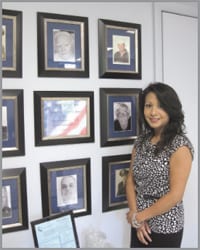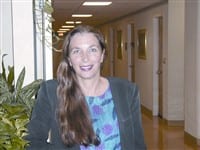Movement on the Home Front Care@Home Keeps Clients Independent and Moving to the Beat
Sherill Pineda calls them her “angels.”
These are the close friends who starting coming to her in the summer of 2010 looking for help with the care of aging parents, many of them veterans, in their homes. And they are the individuals Pineda, a veteran of the home health care industry, credits with giving her the motivation, confidence, referrals — and a solid foundation in the form of a growing client base — to start a business she calls Care @ Home.
“My friends said, ’don’t worry about the money — worry about taking care of our parents, that’s the most important thing,” said Pineda. “That same set of values, safety, and independence, and quality care is what we have put in place for all our clients.”
And today, it is those friends, not to mention a host of other clients, who are using that word ’angel’ to describe Pineda and her staff members, who bring a decidedly personalized style of care to their work, one that has enabled the company to achieve steady growth and a reputation for education, innovation, and giving back to the community.
Regarding the latter, Pineda has created what she calls the CARE Foundation, which stages a number of fundraising events, with some of the proceeds funneled to local charities, veterans groups, and other local help organizations. “We try to do our part, whether it be big or small,” she told HCN.
As for education and innovation, Pineda does a good deal of speaking, especially on the subjects of Alzheimer’s Disease and the importance of physical fitness to the quality of life for all seniors. In fact, she’s a certified instructor in what’s known as Zumba Gold, a modified version of the increasingly popular Latin dance workout program designed especially for baby boomers.
And she’s brought it to a number of area senior centers and other gathering places, with solid results in terms of participation and reception.
She admits that she never thought that she’d be educating and entertaining seniors to the beats of ’40s ’boogie woogie’ or ’50s Elvis Presley through the popular Zumba dancing exercise routine, but its become a big part of her community outreach.
In fact, it’s working so well that her fitness work, and the ties to the veterans community, led the 44-member 215th U.S. Army Band to reach out to Pineda and volunteer its talents for a CARE Foundation fundraiser that became “A Tribute to Our American Heroes,” staged recently at Holyoke High School auditorium. The event raised funds for homeless veterans.
Pineda told HCN that other programs, in addition to 24/7 home care, include educational outreach in the workplace (called Care @ Work), at assisted living centers, or anywhere she can plug in her speakers and iPod and get people dancing. In some way or shape, Pineda says all outreach, volunteer or otherwise, benefits the company, the client, or the community.
With a trained staff of 40, Care @ Home is well on its way to securing a firm foothold in the home care industry in the Pioneer Valley. And for this issue, HCN, takes a look at the company and its ability to give back to the community in unique ways, while also offering skilled nurses and certified nursing assistants (CNS) to care for those that need compassionate, sometimes physical, and usually fun care and attention.
Working Relationships
In Pineda’s East Longmeadow office, there is a wall of yellowed, official Armed Services portraits, as well as recent photos, that showcase some of her first clients.
While veterans are not her only target group, they are the core of her young company’s client base. The company is an authorized agency for the Veterans Administration (VA), she explained, “and based on their eligibility and the VA requirements, if veterans meet the standards, they can receive home care services through what is known as the Home Base Program; our state really supports our veterans.”
Kathleen Plante, care transition and community liaison for Care @ Home, adds that the Home Base Program’s goals mirror those of the agency, and include safety, independence and the goal of reducing the need for future hospitalizations.
“The program is designed to facilitate keeping them at home as opposed to having to go into an institution or other facility,” she explained. “Our person-centered approach is the mission of the agency and it secures the best possible outcome for our clients and their families. And of course our skilled nurses work with the physician, all to reduce the potential for relapse of a health issue, which could mean going back into an institution and the loss of their independence.”
Potential clients are introduced to the agency through relationships built by Pineda and her team. In fact, it is through current relationships, especially connections to the business community, that she projects strong growth for the new Care @ Work program.
The planned outreach to employers and employees through Care @ Work serves to explain to those still working and caring for a family member of any age, and for pretty much any medical reason, that there is help available. The presentation, which is in the development phase, is designed to move through a human resources department or employee assistance program (EAP).
Whether from a work-related injury, or one of the top four health issues Pineda sees — dementia, post-traumatic stress syndrome (PTSD), diabetes-related aliments, and cancer — transitional efforts from hospital to home or assisted living can be traumatic. Pineda and Plante both say that from the start, effective care planning and medical follow through both lead to better overall health and a sense of security for the clients and their families, including the need for respite services.
Early transition planning, quality care, and engagement, said Pineda, are qualities that make Care @ Home a different and innovative aging-in-place company.
“We are clinically and socially involved with our clients,” she noted. “We’re creating an individualized care plan, and making sure we continue to have activities with them.”
Young at Heart
But when Pineda means ’activities’, she’s not talking about crossword puzzles and Bingo. In fact, she finds some of her volunteer speaking and Zumba Gold requests stem from the fact that older individuals don’t want to play Bingo anymore.
“They say to me, ’we don’t want to hang out with those ’seniors’ at senior centers … we want to learn new things, we’re tired of playing Bingo’,” said Pineda as Plante adds good naturedly, “they don’t think they’re old; they think the others are old!”
And that dislike of a ’center for old people’ explains Pineda, is what is keeping many younger seniors away from physical activity, which is typically offered only in the local senior centers — and she notes, that using the words ’senior,’ ’golden,’ and ’elderly’ is already becoming increasingly unpopular among her clients.
This changing view of what ’old age’ really means to her clients, coupled with her awareness of the importance of staying active throughout one’s life, explains the emphasis Pineda places on physical and mental fitness in her work.
Last year, she became Advisory Council member of Western Mass. Healthy Aging Coalition, and a Matter of Balance coach in partnership with the Mass. Department of Public Health.
“Through the Matter of Balance program, we do a series of eight sessions that are two hours each, educating our aging population about fall prevention,” said Pineda, adding that one bad fall can physically and emotionally shut a person down due to the severity of the incident, resulting depression, and the often debilitating fear of falling again.
But Pineda says learning and then practicing dance can potentially provide a needed confidence level to those who have fallen and fear falling again, and this is one of many reasons she has tried to introduce audiences to Zumba Gold and its many possible benefits.
As a certified Zumba Gold instructor, Pineda has incorporated her exercise routine, a combination of Latin and International music with a fun and effective workout program, into weekend programs in which she educates her audience (people in their 60s and 70s), about the importance of staying active, no matter their age.
In that class, she discusses exactly what Alzheimer’s disease is, the early signs, what future help will be needed, and more importantly, how staying healthy may slow or prevent the onset of the disease and various forms of dementia. Staying as active as possible is the key, said Pineda, who also serves as chairperson of the Alzheimer’s Association Diversity Advisory Council (of Massachusetts and New Hampshire).
She noted that after some quick discussion with questions and answers, Zumba begins.
“Then, and only then, do they get to do the dancing; they have to listen first, and then we have fun.”
But she stressed repeadedly that the dancing is far more than just fun; it’s medically important, and will become ever more so as the huge Baby Boom generation continues to age.
All For One, One For All
While Pineda is building her business to care for those in need now, and in the future, she and Plante will complete the structure of the CARE Foundation, and will soon have a board of directors to determine the future beneficiaries of fundraising events for local charities, and a possible endowment for clients that need help with financing their care.
To that end, Pineda says that Care @ Home is constantly looking for collaboration and partnership, not just in home health care and fundraising, but with other skilled professionals who can assist Pineda with bringing more educational outreach to the seniors and family members.
“We’re bringing health care to the next level,” said Pineda. “And that next level means breaking old molds and keeping as many seniors moving, educated, and engaged as possible.
Plante agreed. “This whole model of reaching in to every piece of people’s lives is what health care is going to be; we’re being proactive about it.”
And Pineda, who by all accounts is now fulfilling that role of ’angel’ to her clients, will be singing and dancing to Elvis, or whatever song of choice her audience wants to step to, just to keep them moving, safe, and independent at home, or wherever home is.
“As long as I have my portable speaker, my iPod and my flats,” she said, “I’m ready to go.”
Elizabeth Taras can be reached at taras@businesswest.com



Comments are closed.